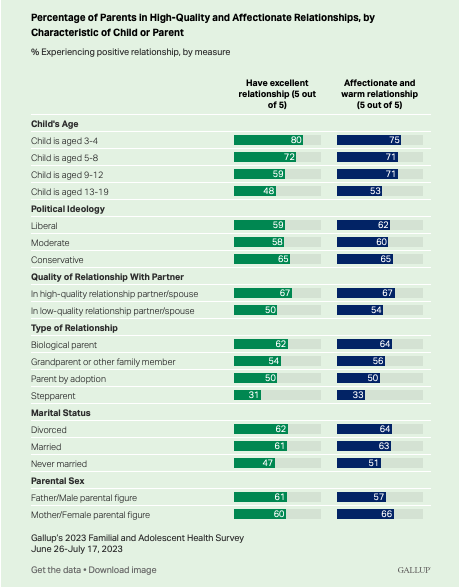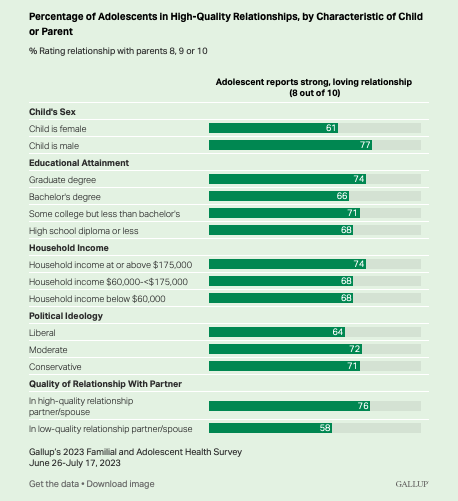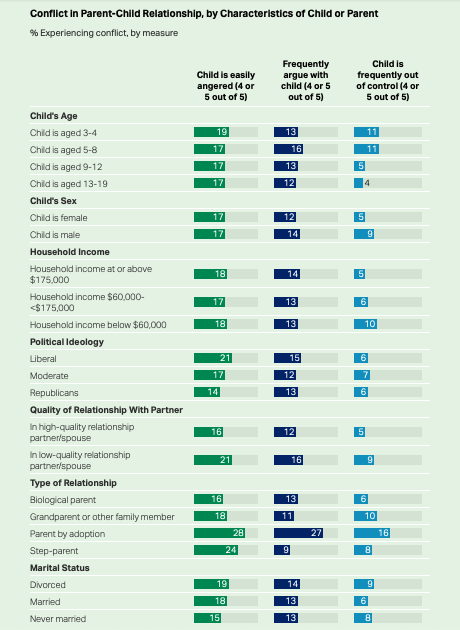(ZENIT News / Washington, 21.02.2024).- Gallup’s 2023 survey on Family and Adolescent Health asked parents to describe the quality of their relationship with their children in the home. A previous survey of this demoscopic group and other studies show the different tendencies of young people given the risks that present-day life imposes on them.
Gallup’s poll focused on the healthy and not very conflictive relationship of parents and children, which varies according to individuals’ characteristics. It seems normal that adolescents have relationships of diminished quality with their parents than younger children, although parents see the lack of control less frequently than do adolescents.
Highlighted is the fact that married parents report relationships of greater quality than those that have never been married, as well as biological parents compared to other relatives. Parents with a conservative attitude report more harmonious relationships with their children and of greater quality compared to liberal or tolerant parents.

The data shows that the use of social networks is associated with bad mental health, according to the Family Studies Institute, and less regulation by parents on the time adolescents spend in front of a screen. Another study of the same Institute found that warm and disciplined treatment improves adolescents’ mental health.
Noticed is that the relationship of parents depends on the child’s age, as it’s better with younger children three and four years old, when 80% of parents described their relationship as excellent, compared to 48% with an adolescent child between 13 and 19 years of age.
It’s striking that the sex of parents and children doesn’t change the evaluation of the quality of the relationship: fathers and mothers evaluate relationships with their children in a similar way, the same with the girls and boys. The socio-economic level, education, family income or ethnic origin do not determine better or worse quality of relationships.
The survey shows that parents with a high quality of relationship with their spouse report excellent treatment with the children –67% –, compared to parents whose conjugal relationship is deficient, –50% –.

The differences between liberals and conservatives in daily treatment is similar, but there is greater difference in the establishment of limits and compliance of rules, as the first are more reticent to give negatives or ask for order.
Adolescents that described their relationships with their parents as very good also had parents that described them as such, 86% of parents described their relationship with them as excellent.
An unforeseen difference in the results was that parents see boys more likely than girls to have a strong and loving relationship: 77% as opposed to 61%.
There are no differences among black, Hispanic or Anglo parents in regard to loss of control in the children. Asian parents report lower rates. White parents are more likely to report arguments with greater frequency.

Needless to say, a high quality of relationship is important for the wellbeing of parents and children. Children with a high quality of relationship with their parents are much less likely to show signs of depression, anxiety or suicidal ideas; their behaviour reflects a positive social development and stronger mental health for the future, according to the Gallup study.
The stronger relationships in conservative parents with their children are better than children of liberal parents and shield them from the risk of mental problems. Could it be because they instil more discipline and order? Could it be because they set limits and rules, combining warmth and affectionate treatment, which leads to a balanced development in adolescents? It is desirable that parents and social leaders promote these practices in families and communities.
Thank you for reading our content. If you would like to receive ZENIT’s daily e-mail news, you can subscribe for free through this link.



